Valverde moves into class of his own with fourth La Fleche Wallonne victory
'I knew that if I accelerated away, then I had the legs to stay away all to the finish,' says 2016 winner
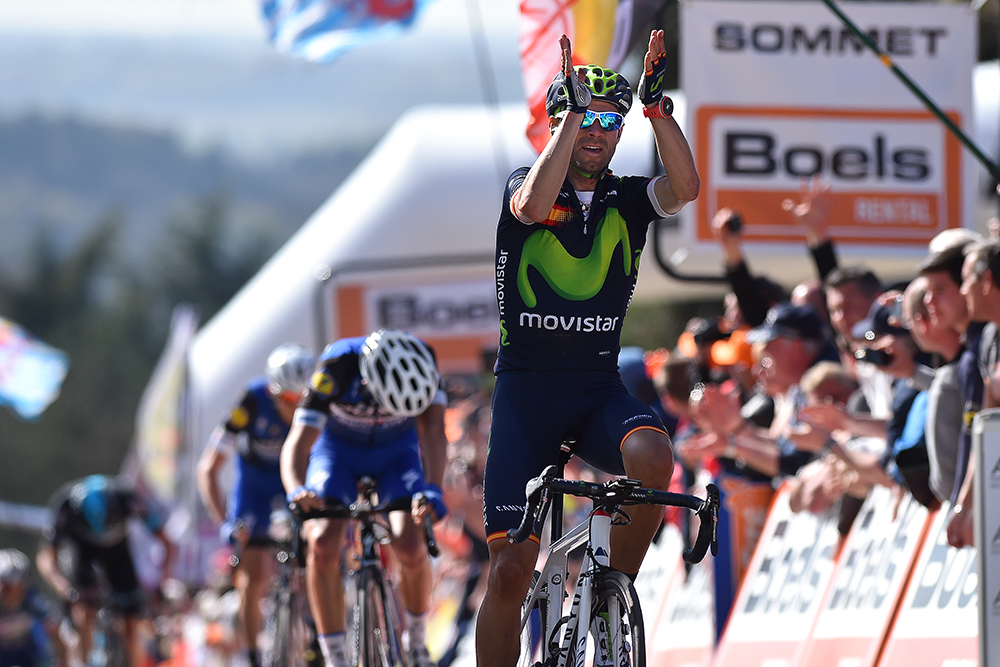
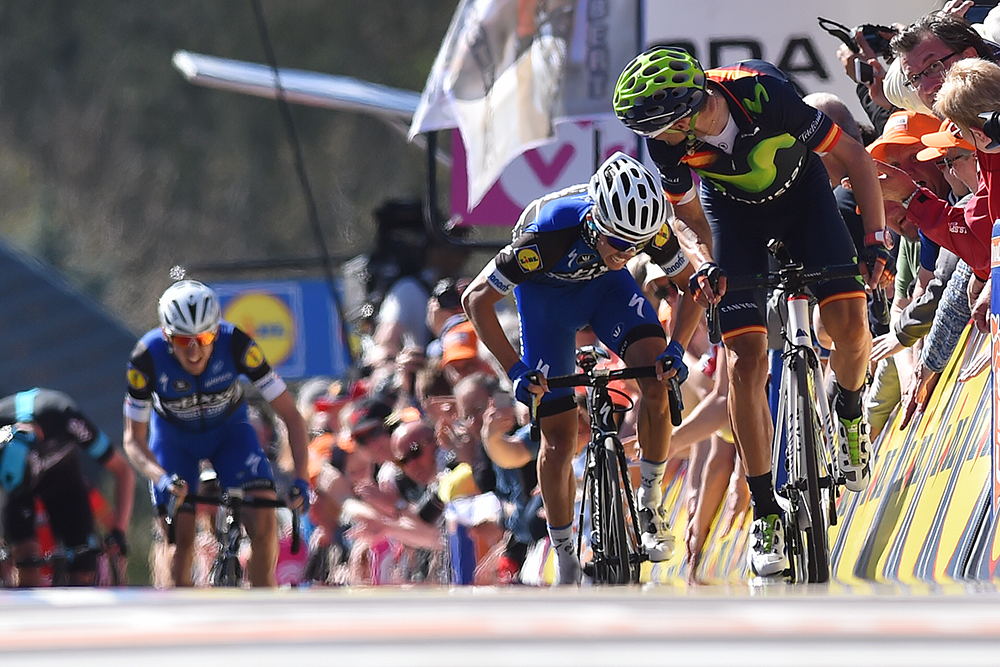
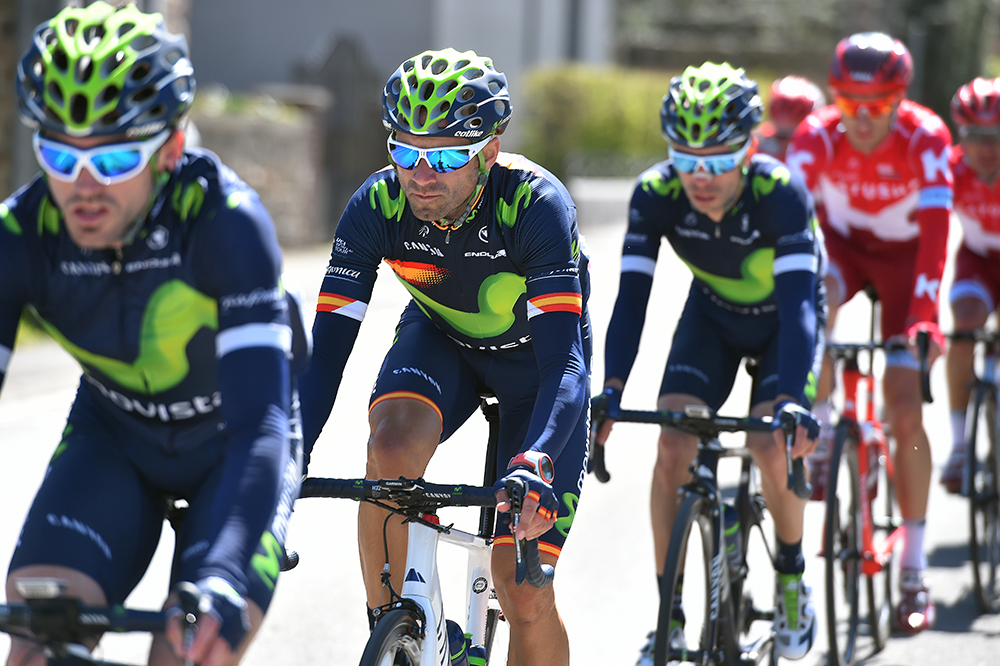
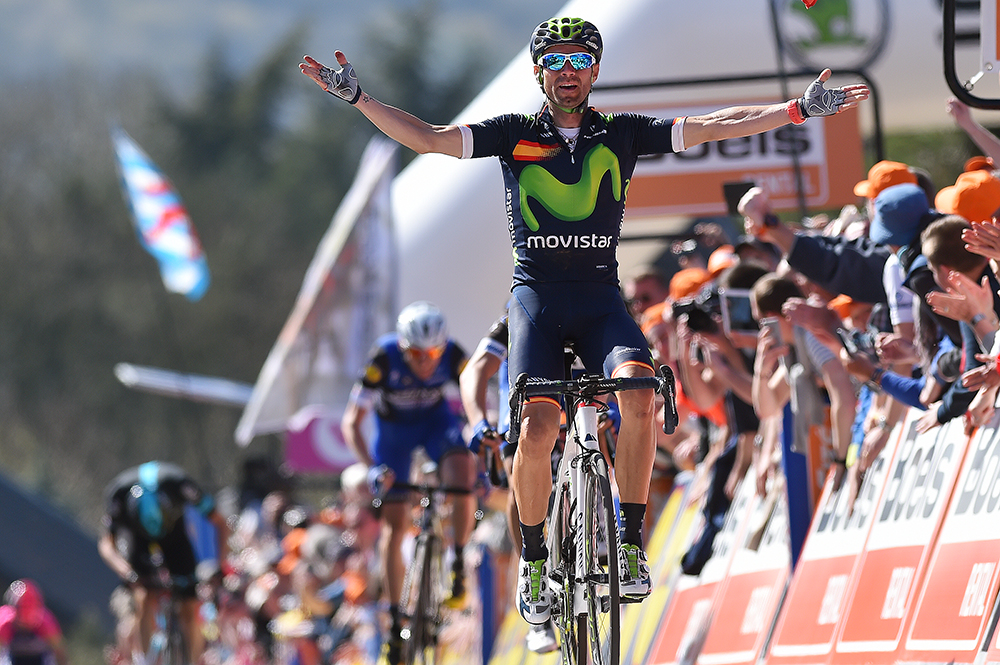
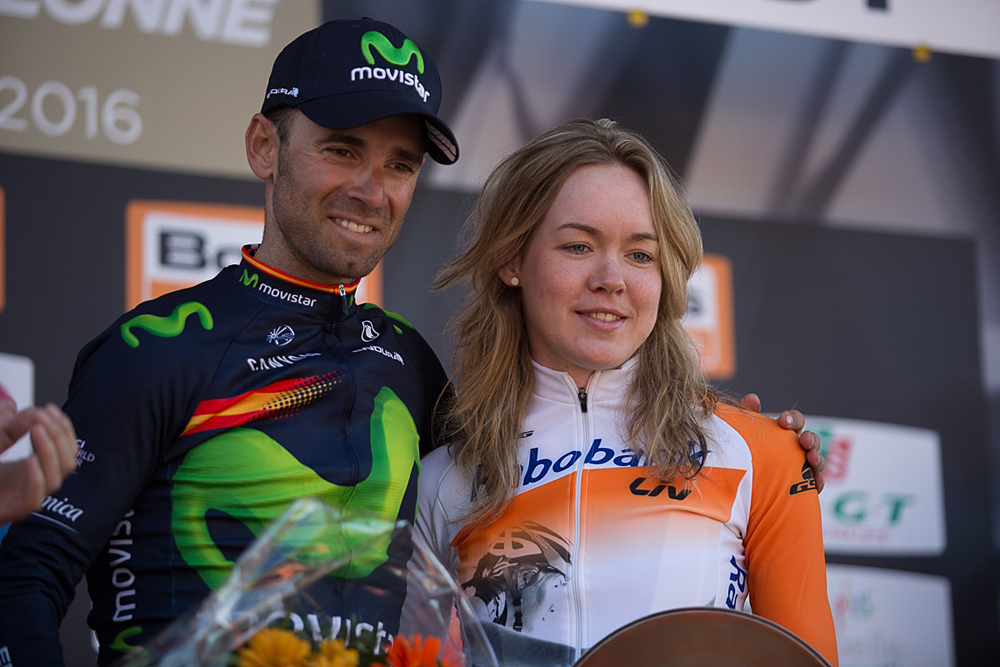
Ultimately, a devastatingly powerful single uphill acceleration less than 100 metres from the finish line and just a few seconds long on Wednesday proved enough to secure Alejandro Valverde (Movistar) his record-breaking fourth victory in the Flèche Wallonne. But, longer-term, Valverde’s record itself has been 10 years in the making and places the Movistar rider ahead of figures as important as Eddy Merckx in cycling’s history books.
Along with the Spaniard, Moreno Argentin, Merckx, Marcel Kint and Davide Rebellin all had previously taken hat-tricks of Flèche Wallonne victories. Kint, too, also captured three straight wins in the race in 1943, 1944 and 1945, just like Valverde in 2014, 2015 and now 2016. But with a fourth victory in 2006 also in his palmares, Valverde now stands alone as the record-holder in the 81-year-old history of the Fleche Wallonne.
At the finish lines, there were congratulatory hugs for Valverde both from Samuel Sánchez (BMC Racing), sixth on the day, and retired rider Erik Zabel before the Spaniard climbed onto the winner’s podium to celebrate both his personal record and Spain’s fifth consecutive win in the mid-week Classic.
“The truth is that it’s incredible, to be in the history books of Fleche Wallonne is a real honour. I knew that I felt good beforehand, but in a race circumstances can change very fast, so I’m very pleased,” Valverde said later. But both on an individual and a team level, Valverde and Movistar might have had the pressure of being the favourites, but they were more than up to the task of handling it.
After Movistar did the lion’s share of the work to chase down the day-long break of 10, Valverde’s team-mate Rory Sutherland notably powered up the pace on the third last climb to try to keep the race under control, then Giovanni Visconti and then Ion Izaguirre covered the late attacks before Movistar made one last collective drive for the foot of the Mur.
Valverde was in perfect position right from the start of the climb, riding at the front of the fast-disintegrating bunch, next to Michael Albasini (Orica-GreenEdge) in the centre of the route. His biggest fear he said afterwards, that he might be closed in. Valverde then raised the pressure slightly by moving a little ahead onto the right side of the road at the steepest ’S’ bend section, something he said later was crucial to his final success.
Giving what was a virtual master-class in how to win Fleche Wallonne, Valverde said, “the key thing was for me not to get blocked before the Mur, so I told the team to go flat out to the bottom of the climb and Visconti guided me up there. I was right at the front because that way you can pick out the path on the climb that you want to take, which is really important, and on that ’S’ bend I took the right handline, where it’s not quite so steep.”
Get The Leadout Newsletter
The latest race content, interviews, features, reviews and expert buying guides, direct to your inbox!
On a climb as demanding as the Mur, ultimately Valverde’s prior experience, combined with his ability to calculate and wring out the last ounce of energy in his legs at exactly the right moments, made him all but impossible to beat. “Purito [Joaquim Rodriguez - Katusha] went for it right after that, and I knew I had to follow, and then I saw Dan Martin and Julien Alaphilippe trying to get away. I followed Dan up the climb and then with 100 metres to go, I knew that if I accelerated away” - as Valverde duly did - “then I had the legs to stay away all to the finish.”
Given the degree of Valverde’s domination, one Belgian journalist almost despairingly asked the Spaniard how many more years he planned on racing Fleche Wallonne. Valverde promised he would be back next year, pointing out “I’ve got a contract with Movistar until 2017” but then added that he would, in any case, “keep on racing Fleche Wallonne and Liege-Bastogne-Liege for as long as I’m a pro.”
Valverde’s build-up for the fast-approaching Giro d’Italia, skipping Amstel Gold in favour of the Vuelta a Castilla y León in Spain to hone his stage race form, had caused some to question whether his one-day ability had diminished as a result. Wednesday’s performance quelled any doubts about that, but Valverde did point out that he wouldn’t be willing to risk the Giro for Liège-Bastogne-Liège if the weather turned foul on Sunday, as has been forecast.
“Cold, rain or snow, like they’re forecasting, will be difficult for everybody, not just me, and I’ve got this win in the bag so let’s see what happens,” he commented. “If it’s really bad, I’ll see what I have to sacrifice, I won’t want to take a chance on the Giro. But if it’s cold and not raining, that’s not a problem.”
With a view to racing the Giro d’Italia Valverde has taken a very different approach path to the Classics in general, missing out on both the Vuelta al País Vasco and the Volta a Catalunya. Instead, Valverde had taken part in a long training camp in the Canaries, not at altitude, he said, but on the flatter part to the south and going for “the longest, steadiest climbs I could find. Not racing so much made me very keen to get back into it,” with two stage wins and his first ever overall victory in Castille y León preceding his fourth Fleche win.
With his confidence sky-high after his Fleche win, Valverde used his press conference to fling down the gauntlet regarding the Giro, saying he will now go there “to try and win it. The rivals will be very hard, [Vincenzo] Nibali will be very strong, [Mikel] Landa will be strong, but that’s the idea.”
Afterwards, he confirmed, he will be doing the Tour, where he finished third last year, “but only with the idea of helping Nairo [Quintana] to win it.”
“I’m not going for the overall classification, I won’t be stressed about losing time in the first week, if I have to lose time I will. Then I’ll head onto the Games, where the route suits me very well. The Games will be the big objective, even if with just five riders in a team, it’s always a bit of a lottery.”
Although Valverde shows no sign of wanting to retire yet, at 36 and with seven Ardennes Classics now in his collection, the question of what kind of sporting legacy the Movistar pro may soon leave behind is getting harder to avoid. “This is never a game for me,” he said a little sharply when asked how seriously he took the idea of where he stood in sporting history, “and winning this race four times and getting that record matters a lot.” There can be little doubt that thanks to his fourth Fleche Wallonne win, too, come what may on Sunday in Liege Bastogne Liege, Valverde’s 2016 Ardennes week can only be described as an enormous success.
Alasdair Fotheringham has been reporting on cycling since 1991. He has covered every Tour de France since 1992 bar one, as well as numerous other bike races of all shapes and sizes, ranging from the Olympic Games in 2008 to the now sadly defunct Subida a Urkiola hill climb in Spain. As well as working for Cyclingnews, he has also written for The Independent, The Guardian, ProCycling, The Express and Reuters.
